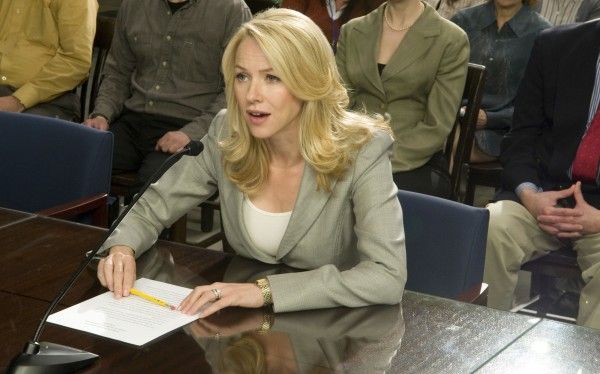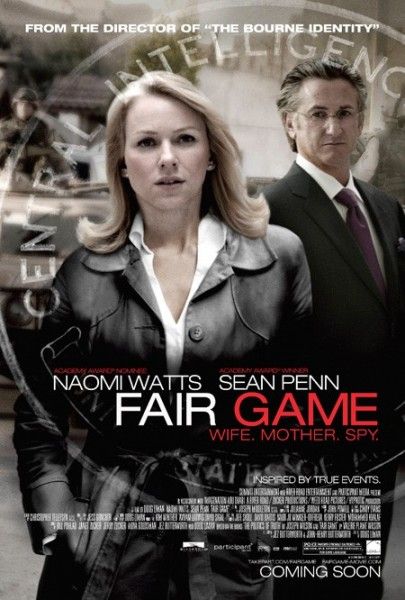If someone told you a story about a CIA agent getting outed to the media by the upper echelons of the White House thus ruining that person’s career, putting their life in danger and exposing their international contacts, you’d probably think to yourself, “Wow, that would make one hell of a movie!” In this case, that’s exactly what happened. What are the repercussions for such an action and how do you even begin to fight back against one of the most powerful institutions on the planet? My review of Fair Game after the jump.
Shortly after the events of 9/11 and leading up to the Iraq war, CIA agent Valerie Plame (Naomi Watts) is busy traversing the globe in an effort to find out if Iraq is in the process of developing a nuclear program. When there is a question of Iraq possibly having a sales agreement with Niger to buy uranium in the form of yellowcake, former ambassador Joe Wilson (Plame’s husband as played by Sean Penn) is authorized by the CIA to investigate the possibility. After traveling to Niger and speaking with the former Prime Minister, Wilson ultimately concludes that there is nothing to the story. Meanwhile, Plame continues traveling the globe in an effort to gather intelligence from former nuclear scientists once associated with the Baghdad regime. One of these is the brother of a woman Plame has promised the CIA would help get out of Baghdad before the start of the war. This subplot helps to humanize the events leading up to what can only be described as a political tragedy.
Watching the President’s State of the Union Address in which he declares, “The British government has learned that Saddam Hussein recently sought significant quantities of uranium from Africa,” Wilson immediately spearheads an effort to get to the bottom of this faulty information. Unable to come up with any satisfactory answers and looking to set the record straight, Wilson writes an op-ed piece for the New York Times entitled, “What I Didn’t Find In Africa.” The article suggests that the Bush administration knowingly misrepresented intelligence information to justify an invasion of Iraq. Explosive in its allegations, the article elicits a response eight days later by syndicated columnist Robert Novak in a column entitled “Mission to Niger.” Novak writes about Wilson’s trip to Niger and his findings while simultaneously outing his wife as an agency operative.
With her secret identity as a CIA operative now exposed, Wilson and Plame’s lives begin to descend into a free-fall as they battle Washington, the media and even their community. Infuriated with the leak, Wilson goes on a “one-man crusade” to find out the source of the leak, convinced that it was done in retaliation for his recent article. Talking to newspapers, television and anyone who will listen, Wilson tells the media, “The Justice Department needs to establish whether those in the highest office sought to destroy the career of a public servant to punish me for telling the truth.” And that is the crux of this story. Understanding the nature of taking on the White House, Plame’s initial reaction is the polar opposite of her husband’s. She wants to retreat and let events run their course. With their marriage now strained, things only get worse when Plame is eventually relieved of her duties at the CIA. It is not until the FBI conducts an investigation into the matter and the eventual indictment of Scooter Libby, the President’s Chief of Staff, that Plame finds the strength to fight back, thus saving her marriage and setting the record straight.
The historical significance of this scandal is illustrated perfectly at the end of Fair Game in a scene where Joe Wilson instructs a classroom full of students asking them, “How many of you know how many words are in President Bush’s State of the Union Address?” No hands are raised. He then goes on to ask, “How many of you know the name of my wife?” Nearly every hand in the classroom is raised.
Fair Game is a complicated yet satisfying political thriller for grown-ups ripped straight out of today’s headlines. Were it not for the fact that these events actually occurred, you could imagine a team of Hollywood writers trying to come up with the most fantastical political story they could imagine. Anchored by an intriguing story-line and its two main leads, Penn and Watts are convincing as the husband and wife team who would ultimately take on the Washington establishment. It’s refreshing to see a smart, attractive woman at the center of attention trying to commandeer her once promising career and marriage. Penn portrays Wilson as an intellectual yet intense fighter; the underlying fury about to brim over in the pursuit of justice is always palpable. The two play well off of each other, even at opposite ends of the spectrum, in trying to figure out the best approach moving forward. Fair Game employs a strong supporting cast, with David Andrews in particular standing out as a manipulative and icy cool Scooter Libby, the President’s Chief of Staff.
Director Doug Liman (who also acts as his own DP) opens the first half of Fair Game with grand, global sweeping vistas as we follow our protagonist around the world. His continued use of shaky cam, employed to noted effect in The Bourne Identity, adds a sense of documentary realism as we are taken down to the bullet-ridden streets of Baghdad and beyond. He eschews the use of these methods later on and instead chooses to focus on the quieter more nuanced performances of his two main leads. Throughout the course of the story and leading up to the war in Iraq, Liman also chooses to use actual news clips from that period along with dated subtitles that effectively acclimate us to exact time and place. This adds to the heightened sense of realism throughout the film. Liman chooses to close the film with a nice transition midway from Watts providing testimony to the oversight and government reform committee to actual footage of Valerie Plame doing so.
Fair Game is presented in 1080p High Def and DTS HD 5.1 sound. Special Features include an audio commentary from Valerie Plame and Joe Wilson.


